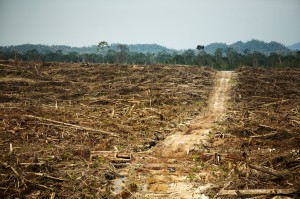
As the latest fashion trends were just unveiled at New York’s spring Fashion Week, it seems an appropriate moment for an update on RAN’s work in the fashion world. Unfortunately, our update is not an uplifting one.
As you might recall, back in December 2009, PAK 2000, a luxury shopping bag manufacturer, announced that they would cut all financial ties with its majority shareholder Asia Pulp and Paper (APP) by the end of 2009. The company also committed to work with RAN to develop and implement a leadership paper policy that gives preference to recycled and FSC-certified paper and phases out all controversial and high conservation value forest fiber, including all fiber from Indonesia, from its paper products within 180 days.
PAK 2000 broke their promises.
After attempting to work with PAK 2000 for a year to verify and implement its commitments, RAN was unable to make progress, and RAN’s Executive Director Rebecca Tarbotton issued the following letter to PAK 2000’s customers in December 2010:
Dear Sir or Madam:
In December last year, PAK 2000 made commitments to your company, to RAN and to other customers to sever its connection with Asia Pulp and Paper, stop sourcing Indonesian and other controversial paper and fiber and adopt a best in class paper purchasing policy. I am deeply disappointed to inform you that PAK 2000 has failed to meet these commitments and appears to be unwilling to do so. Because of this, I once again urge you to suspend contact and business with PAK 2000. RAN believes this company is both misleading and continues to contribute to the destruction of Indonesia’s rainforests.
Since making these commitments last December, PAK 2000’s founder and former CEO Claude Roessiger has been forced out, and control of the company has been taken back by Asia Pulp and Paper (APP) under the leadership of long time APP associate Howard Lo.
After learning that PAK 2000 had a new CEO in May, RAN representatives traveled to New Hampshire for a meeting scheduled with Mr. Lo and his senior management team in July. However, Mr. Lo canceled his participation in the meeting and subsequent requests for a meeting have gone unanswered.
In July, RAN was able to meet with PAK 2000’s CFO and learned that PAK 2000 is failing to meet the commitments made to your company and to RAN, including:
1. Severing “connections” with APP;
2. Stopping the purchase of papers with controversial fiber (including fiber from Indonesia) within 180 days; and,
3. Adopting a “leadership” paper procurement policy with an FSC preference.
We believe that APP misrepresented facts relating to the transfer of ownership away from APP to Mr. Roessiger and PAK 2000’s management at the time and, by extension, to RAN and your company. In December, we were told that APP divested their majority shares of PAK 2000 by selling to the Dutch holding company Overveen and no longer had an interest in PAK 2000. However, over the spring and summer, we learned that Overveen is listed as owned by an individual in Taiwan. When colleagues endeavored to contact the person at the address listed for Overveen, nobody of that name could be found at the address. We became suspicious and conducted subsequent research, which revealed that Mr. Lo has been an employee of APP-controlled companies for over a decade (see Nippecraft 2009 Annual Report).
Our conclusion is that PAK 2000 is back under APP control and has lied to the staff of PAK 2000, RAN and your company. The transparency and trust that had been growing though our negotiations with PAK 2000 under Mr. Roessiger’s leadership, and that had been a cornerstone of the voluntary agreement reached between PAK 2000 and RAN, have disappeared. Further, PAK 2000 has reneged on their commitments to eliminate controversial fiber by July 2010 and to adopt an FSC preference procurement policy. In fact, as an affiliate of APP, PAK 2000 may lose its FSC chain of custody certification entirely.
Given these developments, RAN can no longer recommend PAK 2000 as an environmentally responsible or reliable business partner. We urge you to eliminate any business you have with PAK 2000 due to the company’s failure to meet its commitments, lack of transparency and links to APP, a company whose history is rife with social, environmental and financial controversy.
We apologize to you for any confusion and inconvenience this new information may provoke and look forward to learning what actions your company will take given this new information.